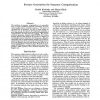Free Online Productivity Tools
i2Speak
i2Symbol
i2OCR
iTex2Img
iWeb2Print
iWeb2Shot
i2Type
iPdf2Split
iPdf2Merge
i2Bopomofo
i2Arabic
i2Style
i2Image
i2PDF
iLatex2Rtf
Sci2ools
AAAI
1998
1998
Feature Generation for Sequence Categorization
The problem of sequence categorization is to generalize from a corpus of labeled sequences procedures for accurately labeling future unlabeled sequences. The choice of representation of sequences can have a major impact on this task, and in the absence of background knowledge a good representation is often not knownand straightforward representations are often far from optimal. Wepropose a feature generation method (called FGEN)that creates Boolean features that check for the presence or absence of heuristically selected collections of subsequences. Weshow empirically that the representation computedby FGENimproves the accuracy of two commonlyused learning systems (C4.5 and Ripper) whenthe new features are added to existing representations of sequence data. Weshowthe superiority of FGENacross a range of tasks selected from three domains: DNAsequences, Unix commandsequences, and English text.
AAAI 1998 | Future Unlabeled Sequences | Intelligent Agents | Sequence Categorization | Sequences Procedures |
Related Content
| Added | 01 Nov 2010 |
| Updated | 01 Nov 2010 |
| Type | Conference |
| Year | 1998 |
| Where | AAAI |
| Authors | Daniel Kudenko, Haym Hirsh |
Comments (0)

